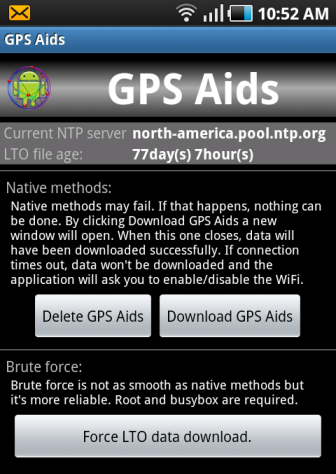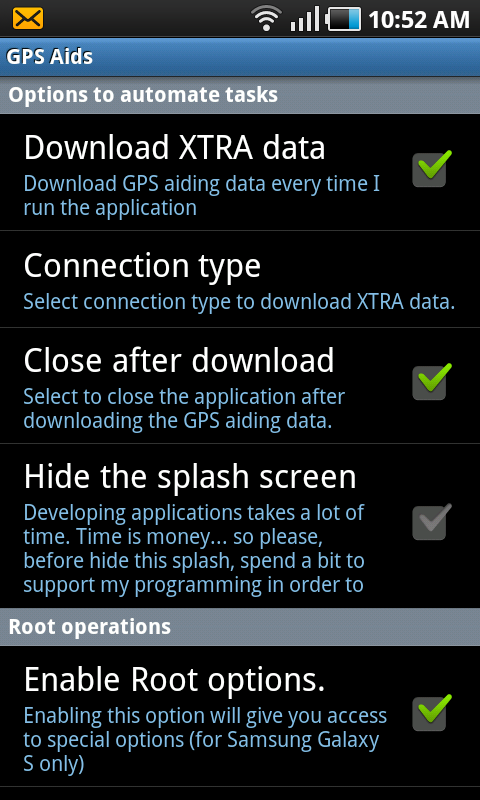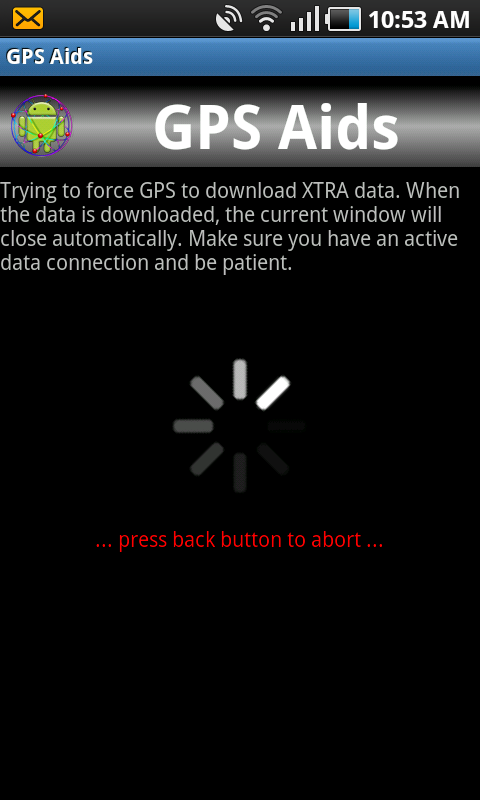 Majority of Samsung Galaxy I9000 users face two issues the non-reliable Wi-Fi and inability to get a GPS location fix by the device. Solution to the Wi-Fi problem was shared earlier, and while the "GPS Fix" issue somewhat got tackled after Android 2.2 update many users are still facing troubles getting a fast GPS fix on their devices.
Majority of Samsung Galaxy I9000 users face two issues the non-reliable Wi-Fi and inability to get a GPS location fix by the device. Solution to the Wi-Fi problem was shared earlier, and while the "GPS Fix" issue somewhat got tackled after Android 2.2 update many users are still facing troubles getting a fast GPS fix on their devices.
To get rid of the issue a new free application is now available for download in Android Market pushing extra GPS aiding data resulting in a better and faster GPS satellite fix on Samsung Galaxy I9000.



The application features two modes - "native" and "forced" where forced mode require a rooted device. The native method injects XTRA data into GPS, the forced mode downloads a file to the SD and then copy it to device system folder (requires root with BusyBox installed).
Comments
Explanation from RCinFLA at XDA forum
Here is an explanation from RCinFLA at XDA forum :
Like to share my experience as cellphone chipset designer and my dealing with various parties involved with GPS in phones.
Many of the issues are caused by business interests involved and there are quite a few parties plying to control location based services revenue stream.
SUPL, secure user plane protocol AGPS was created by network operators interest in mine, with the objective of putting them in the controlling position when it comes to extracting revenue from location based applications on their network.
Control plane AGPS is a general system where network operator independent entities can create a assist server along with possible services offering. They can encrypt their access to allow only subcribed (paying) users to access their service. The network operators has little control over this scheme.
With SUPL, in most cases, network operators outsource the location server function. Network operator hold location of their cell tower, as a total database, in close confidence. The network tower locations are also very dynamic over time. I believe the AGPS contractors don't get reliable and timely updates from the network operators.
Then there are third party business like 'Skyhook' which is trying to work around the network operator roadblocks by establishing a 'ponzi scheme' server database. If your phone has a good GPS location lock and detects a WiFi network, Skyhook's background app will have your phone send a message to their server reporting the SSID of the WiFi and its location. They then sell their server AGPS service to other companies, like Motorola, for inclusion in their phone software. Motorola may run into conflict with network operators. A network operator might refuse to buy a Motorola phone model with Skyhook installed on it.
Google is the 900 pound gorilla and is trying to wrestle control of location based services from network operators.
Finally there are the GPS chip manufacturers. Almost all of them have an AGPS server scheme of their own and try to promote it. The frontend processing (up to recovery of raw 50 bps satellite data) has unique hardware and firmware that are considered proprietary by the GPS chip manufacturer. In most cases a phone manufacturers like Samsung or Motorola are not allowed to have the software source code for this firmware or information on the actual interface protocol to the GPS chip. They are given a bundled binary file that the phone manufacturer software just dumps to the GPS chip at startup.
It is now up to the phone manufacturer to implement the GPS chip and antenna systems (along with WiFI, Bluetooth, Near Field Comm, and multi-band cellular) and provide software interfaces and drivers necessary to run the GPS function.
For size and cost reasons most recent GPS chips rely on the main application processor within the phone to actually do the GPS fix calculations. The software for this is provided by the GPS chip supplier but it must be coordinated with the particular applications processor chip used by the phone. It must share processing time slicing with the apps processor and work with operating system software resources such as RAM and ROM management running on the phone.
This is the first obsticle as most of the GPS chip suppliers have little expertise in the OS's that may be used (like Android or Symbian). The phone manufacturer usually has to provide help to create and debug the GPS driver software but the drivers are responsible/owned by the GPS chip supplier. There can be unique hardware/software interfaces that must be dealt with, like providing GPS TCXO calibration and cellular corrected frequency timebase to the GPS chip.
Then there is the OS's GPS interface. There can be translation software layers involved here. One such interface is based on GPS NMEA protocol but with additional hooks for things unique to phone operation like battery saver power strobing, and the complicated Secure User Plane or Control plane interface.
The AGPS system design landscape is litered with intellectual properties (patents) by many parties. Qualcomm is a dominate player here since their aquistion of SnapTrak company years ago. Royalties are paid to Qualcomm for every WCDMA phone sold, not only in AGPS area, but on basic CDMA patents used in a UMTS (Wideband CDMA) phones.
Now as to Samsung Galaxy S implementation of Broadcom GPS.
I think there is a lot of evidence that Samsung had early issues with the GPS antenna contact hardware. This has probably been corrected on recently manufactured phones.
I think the firmware supplied by Broadcom has the bandwidth of the correlators tighted down to provide greater sensitivity. This is great as long as there is a very good AGPS system to provide initial satellite ephemeris data. Without a good AGPS network providing satellite information the initial search and lock can take a very long time with narrow bandwidth frequency bins.
I have not seen evidence with my experience that my two Vibrants are receiving any reliable AGPS information from the T-Mobile network. They do seem to get rough Almanac satellite info from Google or other third party apps. These may be based on WiFi detection more then T-Mobile cell tower locations.
In LBStest I noticed that GPS Operational Mode has been set to 'Standalone'. I interpret this to mean AGPS is deactived. I don't see any difference when I switch to MS based assist, and clear the GPS saved memory to prevent it from prejudicing time to first fix lock test. Switching SUPL server to supl.google.com and port 7276 (with MS based operational setting) just seems to make my phone lockup for short periods of time.
Once phone does get full lock on satellites its performance is quite good. (my two Vibrant's were purchased in early Feb 2011). It rivals my Garmin SiRFstar III based GPS unit in locked on sensitivity while inside a building.
I think the AGPS system issues will get worked out over time.
The Qualcomm based CDMA2000 systems (like Verizon) will likely have better initial coordination on AGPS system operation. CDMA2000 also provides network timebase directly compatible with GPS.
Add new comment